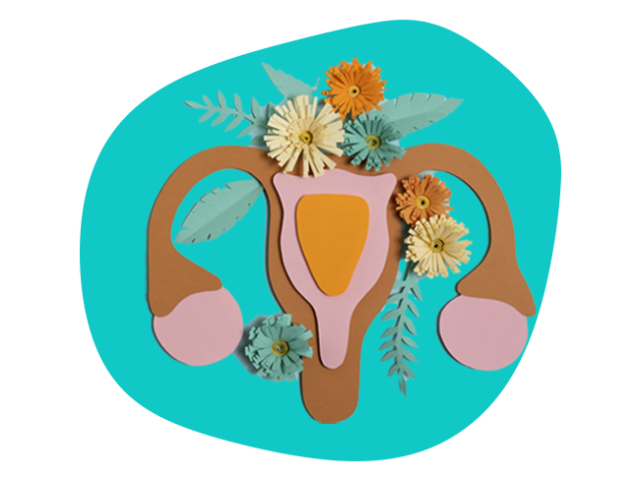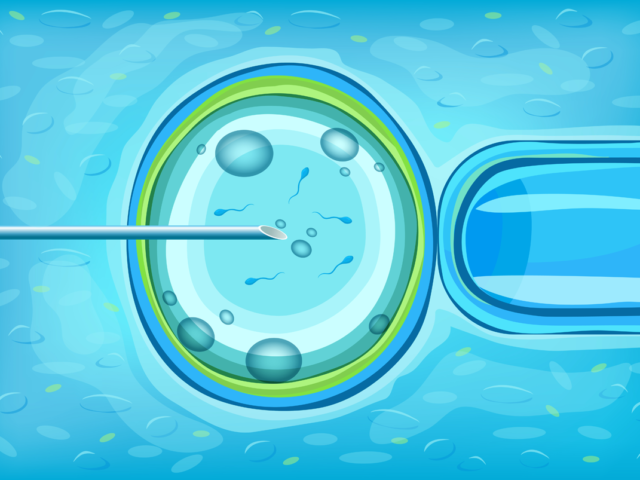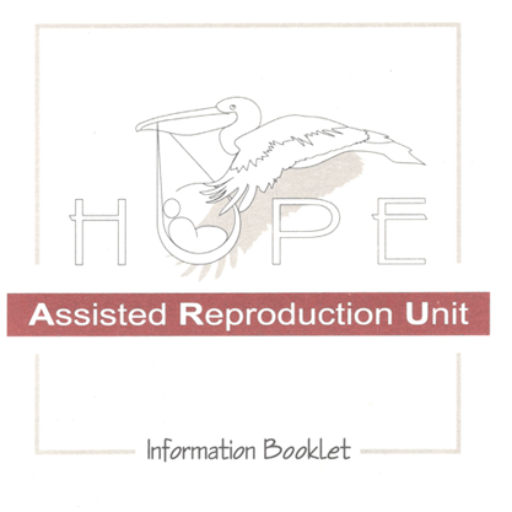In Vitro Fertilization (IVF)
In vitro Fertilization (IVF) is a one of the assisted reproductive techniques available to help couples conceive a baby when they face difficulty getting pregnant naturally. In IVF, eggs are collected from a woman’s ovaries and fertilized with her partners’ sperms in a lab dish. After fertilization occurs and embryos develop, one or more embryos are returned into the woman’s uterus to implant and lead to a pregnancy.
IVF success rate for women doing their first IVF cycle (2020)

Indications for IVF
IVF is indicated for all couples with infertility who failed other less invasive techniques and to couples with the following conditions:
- Couples with unexplained fertility for a long period of time
- Male Factor: Men with low sperm count, quality or motility
- Tubal Factor: Women with blocked or damaged fallopian tubes
- Age related infertility
- Genetic Disorder
- Endometriosis affected infertility
- Ovulatory Factor: Women with ovulation disorders
What are the main steps of IVF?
An IVF cycle typically lasts about 4 to 6 weeks from the start of ovarian stimulation to the pregnancy test, here’s a breakdown of the several steps:
- Controlled Ovarian Stimulation (COS)
- Egg Retrieval
- Sperm Collection
- In vitro Fertilization
- Embryo Culture
- Embryo Transfer
- Luteal Phase Support and Pregnancy Test

Controlled Ovarian Stimulation
Most of the assisted reproductive procedures begin by Controlled Ovarian Stimulation (COS). The female partner is given fertility medications on a daily basis for average of 8-12 days to stimulate the ovaries to produce multiple eggs rather than the usual single egg that develops during a natural cycle. During the administration of the medications, the female is followed up in the clinic by serial ultrasounds and sometimes blood tests to track the development of follicles (fluid-filled sacs where eggs mature).
The dosage and type of medications used in ovarian stimulation are tailored to each individual based on factors like age, ovarian reserve, response to previous treatments and the procedure she is undergoing.
Once the eggs have reached an optimal size and maturity, a trigger shot is administered to induce the final maturation of the eggs.
Our Treatments
Get In Touch With Us
ext. 2344
Book An Appointment
Book a visit to Trad Fertility Center, simply fill out the form below and we will contact you back regarding the intervention you require.
Egg Retrieval
Approximately 35-37 hours after the trigger shot, the egg retrieval procedure takes place. This is a minor surgical procedure called transvaginal oocyte retrieval (TVOR) or follicular aspiration or egg pickup, usually performed under sedation or light anesthesia.
During TVOR, a thin needle under ultrasound guidance is inserted through the vaginal wall and into each ovarian follicle to aspirate the fluid containing the egg.
The collected eggs are then used for in vitro fertilization (IVF).
After the egg retrieval procedure, the woman is kept in the IVF center for a brief recovery period around 1-2 hours where she rests and is monitored. She is discharged home when she is fully awake from anesthesia and can resume her daily activities the next day.


Sperm Collection
The male partner provides a semen sample, which is processed to select the healthiest and most active sperm.
In Vitro Fertilization In the lab the retrieved eggs are fertilized with partner’s sperm either by adding sperm to them in a laboratory dish (IVF) for spontaneous fertilization or by performing
Intracytoplasmic Sperm Injection a technique which involves injecting a single sperm into the egg to facilitate fertilization (refer to ICSI)
Embryo Culture
Embryo culture is a fundamental stage in IVF where fertilized eggs, known as embryos, are grown and observed in a lab environment. After the egg and sperm unite in the laboratory resulting in fertilization, the resulting embryos are placed in a special liquid called culture medium. This solution contains nutrients that support their growth and development. Over a few days, typically 3 to 5, these embryos are carefully monitored by embryologists. Some embryos might arrest while others continue development. They observe their progression, looking at factors like cell division, symmetry, and overall quality. This culture period helps in selecting the healthiest embryos for transfer back into the woman’s uterus, increasing the chances of a successful pregnancy.
Embryo Transfer
Embryo transfer is a vital step where carefully selected embryos are placed into the woman’s uterus. This selection is based on various criteria, including their growth rate, appearance, and cell division.
Usually, one or two embryos are transferred depending on various factors, including the woman’s age, embryo quality, and medical history, aiming to optimize the chances of pregnancy while reducing the risk of multiple births. The remaining healthy and good quality embryos can be frozen for later use, allowing couples to try for pregnancy in the future without repeating the entire IVF process.
The actual transfer is a relatively simple and minimally invasive procedure that is performed, in general, without anesthesia. The female partner lies on an exam table, and a thin catheter containing the selected embryos is inserted through the cervix into the uterus. This is done with the guidance of ultrasound imaging to ensure precise placement.
Once the catheter deposits the embryos into the uterus, the procedure is complete. Following the transfer, the woman may rest for a short period before returning home.
Luteal Phase Support and Pregnancy Test
Following an embryo transfer in IVF, the luteal phase, which is the latter part of the menstrual cycle, is crucial for a potential pregnancy. Luteal phase support involves medications like progesterone to help sustain the uterine lining, supporting the chances of successful embryo implantation.
About 10-14 days after the embryo transfer, a pregnancy test is performed. It is a blood test that checks the presence of a hormone called beta-HCG. If the embryo has successfully implanted in the uterus, the body starts producing this hormone, indicating a positive pregnancy test. It’s a moment of anticipation and hope for couples who are undergoing IVF, eagerly waiting for the test results to confirm whether the procedure was successful.
Complications of IVF
IVF, like any medical procedure, can carry potential complications, though they are relatively rare. Some possible complications include:
- Ovarian Hyperstimulation Syndrome (OHSS): This occurs when the ovaries become enlarged due to the presence of numerous follicles and fluids accumulate in the pelvis and abdomen causing pain. Mild cases of OHSS may cause abdominal bloating and discomfort. In more severe cases, symptoms can include rapid weight gain, abdominal pain, nausea, vomiting, shortness of breath, and reduced urine output and might lead to hospital admission.
- Multiple Pregnancies: IVF increases the chances of having twins, triplets, or more, which can pose risks to both the mother and babies.
- Ectopic Pregnancy: There’s a slight risk of the embryo implanting outside the uterus, typically in the fallopian tubes, which can be dangerous and require medical intervention.
- Miscarriage: The risk of miscarriage with IVF is similar to that in natural pregnancies.
- Bleeding or Infection: Rarely, during egg retrieval or embryo transfer, there can be bleeding or infection.
- Emotional Stress: The emotional strain of the IVF process can be significant for some couples, impacting mental health and relationships.
It’s essential to discuss these potential risks and complications with a healthcare provider before undergoing IVF. The majority of IVF procedures result in successful pregnancies without complications, but being informed about the possible risks is an important part of the process.



